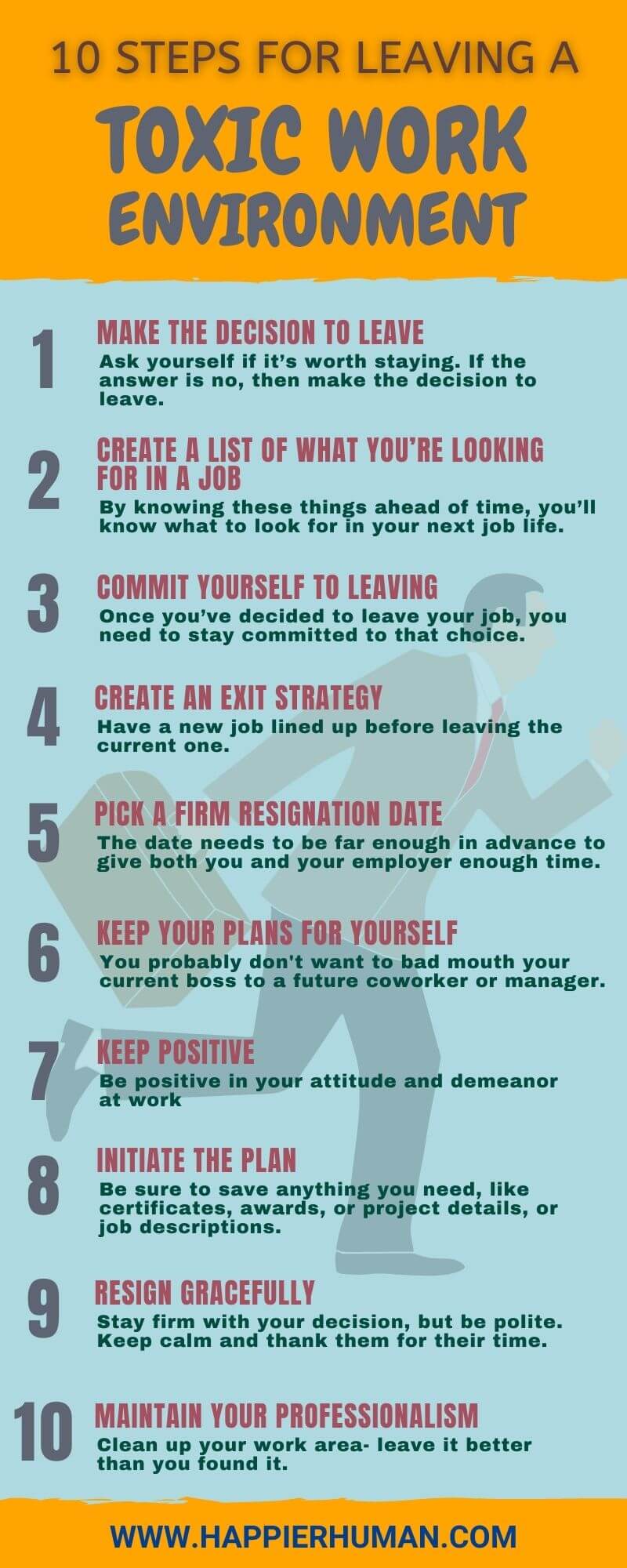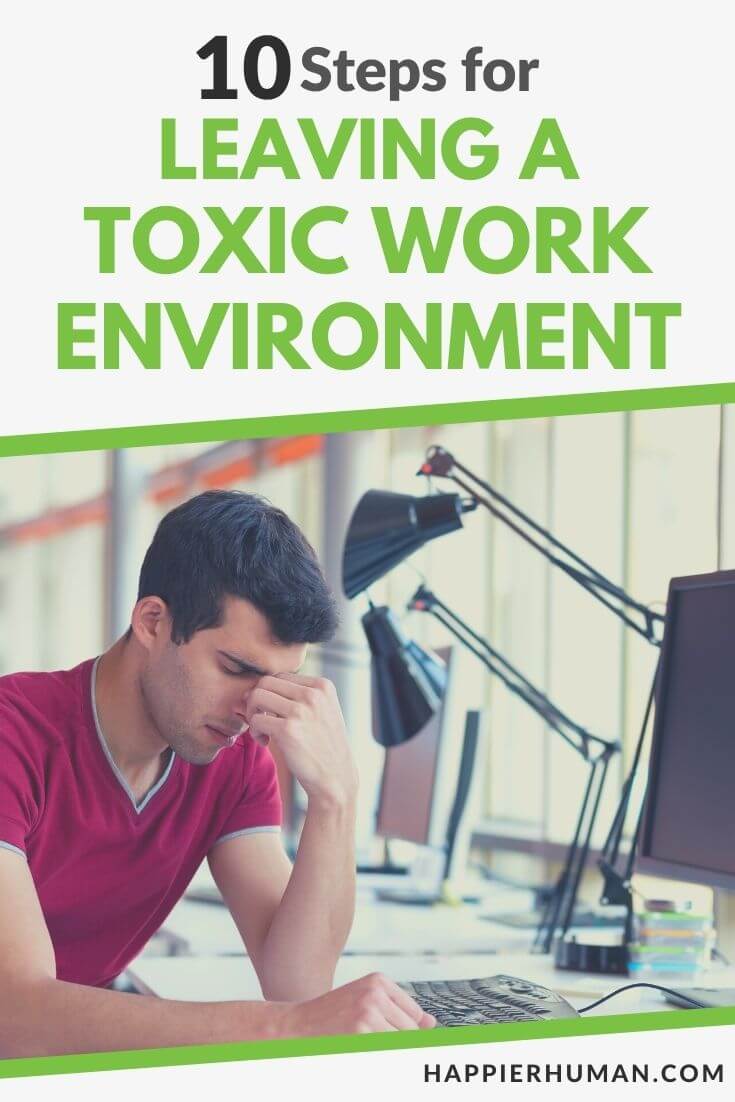There might be affiliate links on this page, which means we get a small commission of anything you buy. As an Amazon Associate we earn from qualifying purchases. Please do your own research before making any online purchase.
Do you come home from work feeling like you’ve just returned from battle? Or a boxing match? If so, you might be working in a toxic workplace.
While I know that changing jobs can be scary, I think you'll agree with me that the benefits for your career, health and emotional well-being are most certainly worth it. To help you move past the toxicity, you’ll need to first recognize the signs of a toxic work environment. Some are more subtle than others.
From there, we’ll discuss why people finally decide to leave their jobs and the negative side effects of not doing so. We will also touch upon how an increasing in working from home during the pandemic has allowed toxicity to creep into your safe space.
I’ll show you how to plan thoughtfully, act professionally, and resign gracefully when the time comes.
(Side note: One of the best ways to increase your happiness and life satisfaction is to plan your day, so you focus on your TOP goals. To get started, watch this free video that details the 7-minute habit for planning your day to focus on what's important.)
What You Will Learn
What is a Toxic Work Environment?
A toxic work environment is when your workplace negatively affects your social, physical, or emotional wellbeing. A toxic workplace affects you personally. Your workplace problems follow you home. Therefore, it creates problems in your relationships, makes you sick, and disrupts your mental health. As you can see, toxicity at work damages far more than your career.
If your workplace is toxic, you'll notice:
If you repeatedly notice these signs, you're working in a negative company culture. Moreover, these signs will be obvious throughout the company. When you find yourself in this situation, it's time to consider finding a new job.
Why People Leave Their Job
According to Forbes, being unhappy at work is the second reason people quit their jobs. Interestingly, finding work aligned with personal values is the third reason.
Other reasons include:
As you can see, most of these reasons are also signs of a toxic work environment. Therefore, you're not alone if you want to leave your job.
How the Pandemic Fast-Tracked Leaving Jobs
More and more people have decided to leave their jobs, especially since the pandemic. According to CNBC, 25 % of employees quit their jobs during the pandemic. With the stay-at-home orders forcing people to work from home, many employees realized that their workplace was toxic.
While working from home, they experienced a better work/home balance. For example, they were able to spend more time with their families. Also, they weren't subject to the negative culture of their workplace because they worked remotely. Furthermore, they experienced a level of autonomy that didn't exist before the pandemic.
Ultimately, employees working remotely had to learn to balance work and home life. Honestly, it's a bit like juggling. Even with these challenges, many managed to do it, and found that they liked it. Overall, they were happier working from home.
Unfortunately, when companies started requiring people to return to work, many decided to quit. They didn't want to go back to the toxicity. They experienced the effects of a positive work environment.
Effects of Toxicity on the Job
Toxicity at work takes its toll.
A toxic work environment can cause:
Therefore, workplace toxicity affects you in your personal life, but it doesn't have to be so. When your work life affects your home life, it's time to make a change. If the workplace culture doesn't change, then you need to change workplaces.
Steps for Leaving a Toxic Work Environment
Now that I've shown you what a toxic work environment looks like and how it affects you, it's time to look at the actual steps for leaving a toxic work environment.
1. Make the Decision to Leave
Before you actually quit your job, you need to decide if it's the right decision for you. Changing jobs is a big decision that you need to seriously think about.

To start, make a pros and cons list for your current job. List all of the benefits of working there. Then, list all of the negatives.
Ask yourself if it's worth staying. If the answer is no, then make the decision to leave.
2. Create a List of What You're Looking for in a Job
Now, you can't just walk into work and quit on the spot. First of all, you need a plan of action. To create a plan, you need to ask yourself several questions about what comes next.
To avoid moving from one toxic environment to another, you need to ask yourself:
By knowing these things ahead of time, you'll know what to look for in your next job life.
3. Commit Yourself to Leaving
Changing jobs is a big step. It affects so many aspects of your life, like your time, finances, and family. Once you've decided to leave your job, you need to stay committed to that choice.
To help you stay committed, you can make a list of your reasons. Write them out on an index card. Keep it with you, just maybe not at work. You wouldn't want your current boss to see it.
The purpose of the card is to remind yourself often of why you need to change jobs. Doing this will help you shore up your resolve.
4. Create an Exit Strategy
Before you resign, you need a plan.
In this plan, you need to consider:
As you can see, there are many details that need to be worked out. Being prepared will remove the uncertainty and decrease the stress involved.
Personally, I have always believed in having a new job lined up before leaving the current one. On the other hand, I also recognize that some situations make that unadvisable. You need to take your specific situation into consideration.
5. Pick a Firm Resignation Date
Once you've considered everything in step 3, you now need to pick a resignation date. The date needs to be far enough in advance to give both you and your employer enough time.

For you, you may need time to find another job. Also, you may need to save money so that you can support yourself if you don't find a job quickly.
As for your employer, it's common courtesy to give two weeks' notice. This gives your boss enough time to find someone else. If you don't give notice, you might look like a poor prospect to future employers.
6. Keep Your Plans for Yourself
While it might be tempting to talk about your plans with others, I advise against it. Sometimes, this information gets leaked, and it may not work out in your favor. Don't get fired before you can resign.
You definitely don't want to discuss it at work, even if you have friends there. If you need advice, find someone outside of work, and I mean far outside of work. You might even want to avoid talking about it with anyone that works in the same job field. The career network can turn into the career grapevine quickly.
Plus, you never know who you'll meet up with in the future. You probably don't want to bad mouth your current boss to a future coworker or manager.
7. Keep Positive
Anyways, you don't want to add to the toxicity that already exists. You're leaving a negative environment because you don't want better.
Be positive in your attitude and demeanor at work:
Ultimately, be the model employee. Remember, you may need your current employer as a reference. Most of all, remember your values. You're better than stooping to their level.
8. Initiate the Plan
Now that you've picked a firm date, it's time to prepare for leaving.
To do this, you need to update your resume and cover letter. Start by gathering the information you need. Be sure to save anything you need, like certificates, awards, or project details, or job descriptions.
I suggest creating a portfolio for job hunting. This helps place all of the information prospective employers want in one place.
9. Resign Gracefully
After you've planned and prepared, now you actually have to resign. I know the thought of going to your boss to tell them you're leaving can be scary, but you can do it.
Have confidence and remind yourself that this is for your benefit.
To resign gracefully:
When you resign, your boss may react in many different ways. They may be angry. On the other hand, they may try to convince you to stay.
Stay firm with your decision, but be polite. Keep calm and thank them for their time. Then, bring the meeting to an end.

There's no point in a lengthy meeting. You said what you had to say, which was that you were resigning.
10. Maintain your professionalism
Once you've resigned, you still have to work until your end date.
Be sure to take care of final business:
Final Thoughts on Leaving a Toxic Work Environment
When leaving a toxic work environment, it's important to remember that you're leaving a negative environment for a more positive one. Therefore, you need to approach resigning your job in a positive way. The positivity starts with you!
Model the behavior you want to see in your employer. Ultimately, the decision to leave your job is about making positive changes in your life. Start by being positive throughout the resignation process. In the end, this will help you to have a better career and personal life. Most of all, you'll be the best version of you that you can be. If you want more help with being successful in your career, check out our article on 51 affirmations for career success and advancement.
Finally, if you want to increase your happiness and life satisfaction, then watch this free video that details the 7-minute habit for planning your day to focus on what's important.


